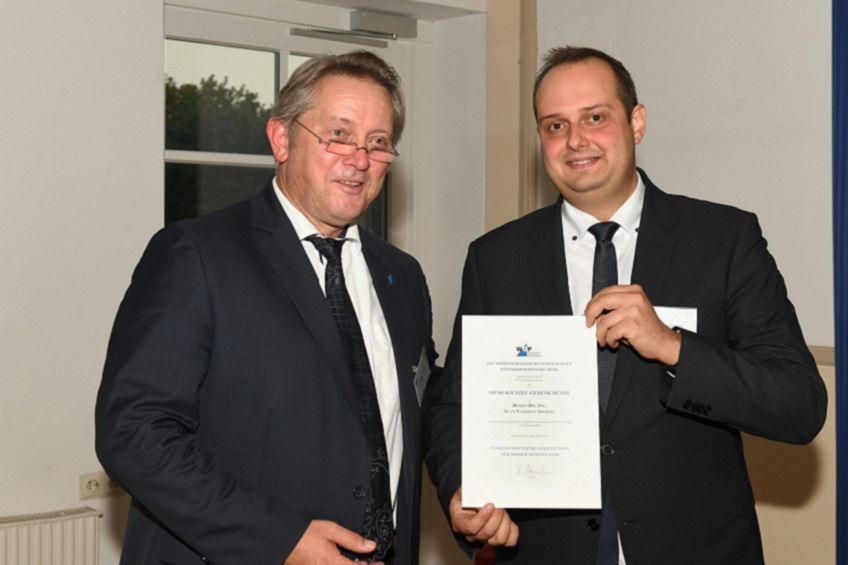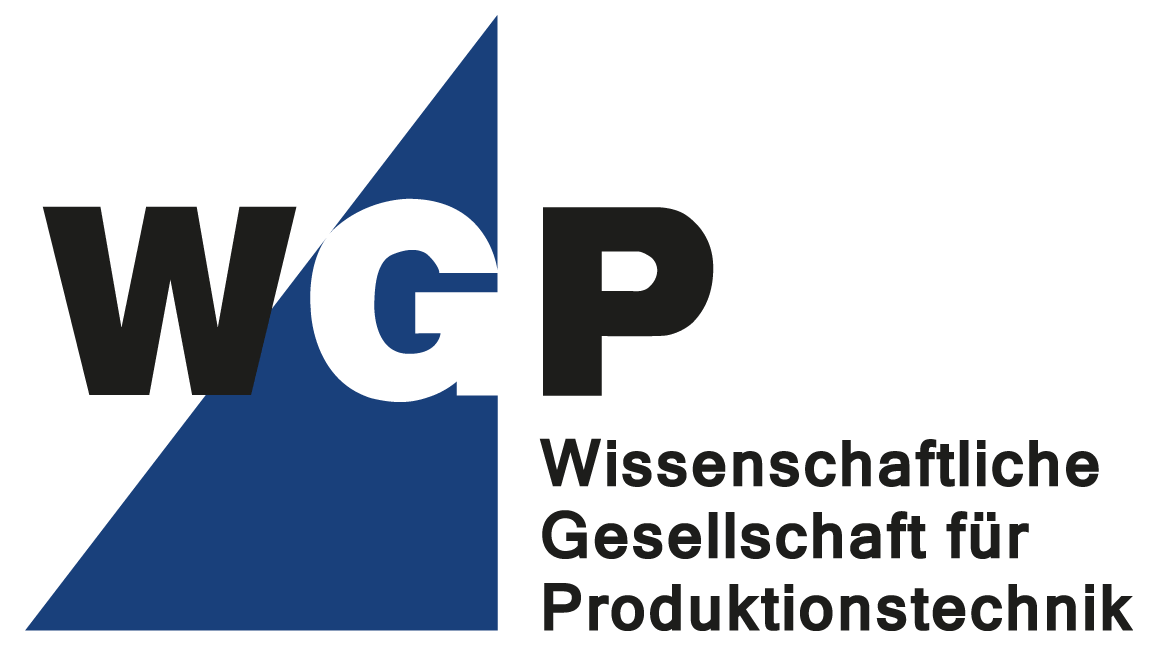
Hamburg, 01 October 2019 – Young researcher Dr. Ivan Iovkov yesterday received the renowned Otto Kienzle commemorative coin from the Scientific Society for Production Engineering. During the annual congress, WGP Executive Committee member Prof. Peter Nyhuis presented the exceptional scientist with the award: “With his scientific acumen and interdisciplinary thinking, Dr. Iovkov has not only shown new paths for machining production in his dissertation. Already during his studies, he developed innovative methods for more efficient production, which have already found international recognition and entry into industry”.
“Artificial intelligence should make German production fit for the future,” says Prof. Jörg Krüger, initiator and main author of the WGP position paper, explaining his motivation. “But so far there has been no systematic approach with which the manufacturing industry could exploit this potential.” As a rule, small and medium-sized companies in particular do not have the necessary financial and personnel capacities to integrate AI technologies into their production. “As an association of leading production technology professors in Germany, the WGP has unique production knowledge,” says Krüger, who is also head of the Automation Technology business unit at the Berlin IPK Fraunhofer. “This domain knowledge gave us the opportunity, together with companies, to develop a model for a methodical approach and to facilitate the industry’s entry into AI with concrete recommendations for action. In this way, we want to play our part in keeping industry internationally competitive in this area as well.”
More efficient and environmentally friendly production is Iovkov’s overriding goal: “Basic research is rarely an end in itself. For me, it is always important to have a practical approach that takes us further into the production of tomorrow – and to look beyond the edge of the chipper’s plate.
During his studies at the Institute for Machining Technology (ISF) at the TU Dortmund, the 34-year-old has shown himself to be unusually inventive at an early age. As soon as he was employed as a student assistant, he developed a magnetorheological torsional vibration damper together with his HiWi father Dr. Michael Kersting between 2006 and 2009. Behind this unwieldy term is a coupling equipped with magnetic coils containing oil with magnetic particles. By changing the magnetic field, the consistency of the fluid can be changed, thus reducing or completely eliminating vibrations that occur in long tools during deep drilling. This project was the beginning of a series of innovations that Iovkov developed and accompanied.
Perfect drilling axes despite reduced KSS
He dedicated his doctorate to the cooling lubricant (KSS) in machining, or rather to new methods, in order to significantly reduce consumption. “I would like to promote dry machining or minimum quantity lubrication because they have great potential for reducing the high environmental impact of coolant,” emphasises Iovkov.
When deep drilling with very long tools without or with little coolant, more heat is introduced into the component so that it warps. As a result of workpiece deformation, the resulting drilling axis generally deviates from the ideal drilling axis during deep drilling. Wahl-Dortmunder not only developed a method to predict the extent of these inaccuracies using simulation. He also found a way to compensate for the deviations from the ideal axis, the so-called center line, and to precisely maintain the desired drilling axis despite the unavoidable component distortions. “This increases component quality and safety while at the same time achieving high energy and cost savings, because the use of coolant lubricants can be massively reduced. In this way, we contribute our part to more environmentally friendly production.” With his dissertation, Iovkov not only won the year’s best prize, but also a DFG knowledge transfer project. This ensured that today his method is not only used by Daimler AG, which is involved in the research project, but is also applied more widely.
Interdisciplinary and practical thinking
Iovkov emphasises that his own initiative quickly brought him the management of the machining department at ISF, with 15 employees today, who through their ingenuity and commitment successfully acquire and work on all third-party-funded projects together. “But the success is also strongly related to Ivan Iovkov’s personality,” says Prof. Dirk Biermann, head of the ISF at the TU Dortmund. He shows extraordinary commitment for his employees and is always ready to help. Open and fair communication is of great importance to him. This is highly appreciated by his employees and motivates them”. The department head always leaves his office door open, even when things get stressful. For him, this is the symbol of his open ear. And this symbol has been adopted throughout the machining department. “Everyone supports each other wherever possible,” Iovkov is pleased to say. “We are like a second family and also do a lot of things together in our private lives.
A look beyond the rim of the plate
In addition to his soft spot for technology, Iovkov is also distinguished by his didactic talent. The fact that his form of knowledge transfer also motivates him is attested to by the students’ top grades. And in return, he likes to break new ground in teaching, such as in the so-called specialist laboratory, an introduction to the analysis of production processes using the example of turning. Here, too, Iovkov looks beyond his own nose: “It was important to me to pick up the students, in this case the prospective industrial engineers. That’s why I wanted to move away from the classic learning and querying concept and formed groups of four to take on the role of a management consultancy and support us as a manufacturing company with a concrete problem. This proactive approach made it much easier for us to achieve our learning goals. In the end, I just gave the event a different packaging, but that changed the young people’s perception significantly.”
The young scientist also overcame the limits of machining when he developed a test bench for material testing at high strain rates together with students. “Since then, we have been able to carry out such measurements in-house and thus feed our simulations with reliable data,” reports Iovkov proudly. This “thinking across borders” may also be due to the life story of the up-and-coming talent. Born in Sofia, Bulgaria, the young man came to Germany at the age of 18 to study mechanical engineering. His father – himself a mechanical engineer – had advised him to go to Germany if he wanted to learn the trade properly. Ivan Iovkov implemented the advice optimally.
Picture 1: Otto Kienzle commemorative coin handed over (from left to right): Prof. Peter Nyhuis, member of the WGP Executive Committee and head of the Institute for Factory Systems and Logistics (IFA) at Leibniz University Hanover; Dr. Ivan Iovkov, Institute for Machining Technology at TU Dortmund, Quelle: Helmut Schmidt University of Hamburg (HSU-HH), Ulrike Schröder
Picture 2: Dr. Ivan Iovkov, Institute of Machining Technology, TU Dortmund, Source: ISF Dortmund, Florian Vogel
Picture 3: Prof. Peter Nyhuis, member of the WGP Executive Committee, Head of the Institute for Factory Installations and Logistics (IFA) at Leibniz Universität Hannover, Quelle: IFA Hanover
Further Information:
